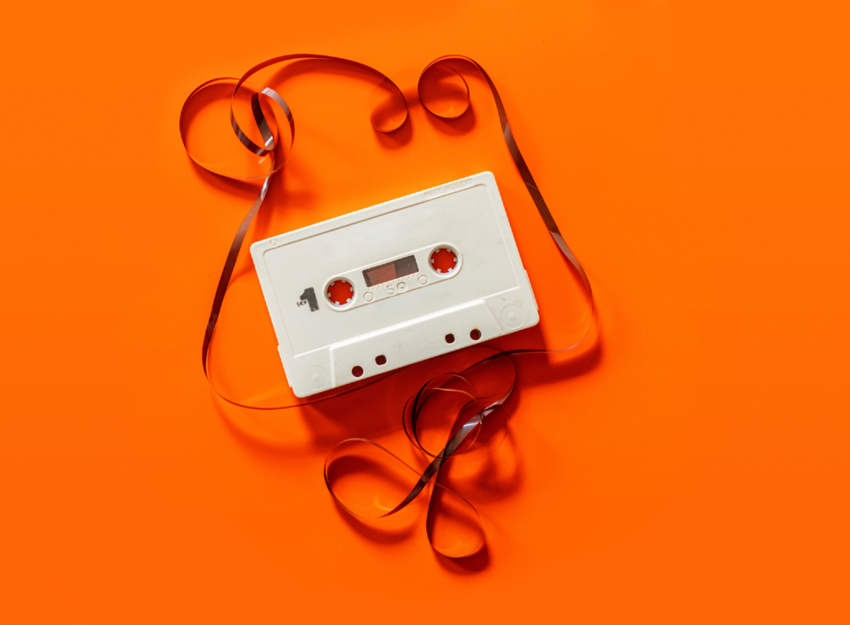Within the last 30 or so years, we’ve gone from the beginnings of the internet to an almost completely connected world. Technology has increased in scope and power, but language is scurrying to catch up. As we’re developing new words and phrases to describe evolving technology, let’s take a look at some analog terms that may soon become obsolete.
VCR
The VCR was on its way out even before streaming rendered DVD players unnecessary. Revolutionary for the movie and home entertainment industries in the 1970s, a "videocassette recorder" allowed viewers to watch movies at home, rewind, and watch them again. Fans could even record TV shows or movies from their televisions. However, 50 years later, VCRs are no longer being made. (The last manufacturer stopped production in 2016.) DVDs, which were smaller and easier to store, and now streaming services have made the term "VCR" practically obsolete.
Fax machine
Fax machines were once a staple of an office setting. These machines, loud and obnoxious though they were, could send documents across a phone line to virtually any location. We’ve since leapt forward to email and file sharing over the cloud, but there are still a few places with fax machines. Medical offices, in particular, love them, so don't forget this term quite yet.
Floppy disk
Imagine carrying around little plastic cartridges on which to save your important files. And heaven forbid you left the floppy disk too close to a magnet or a credit card. File sharing has since gotten an upgrade to USB drives and the cloud. But the memory of the floppy disk lives on through the "Save" icon on your Microsoft Office product. (Try showing any Gen Z-er a dusty floppy disk and they might think you 3-D printed the icon.)
Tivo
Another leap forward in home entertainment, Tivo is the brand of the first digital live TV recorder. Tivo basically worked as both a TV guide and a recorder, allowing viewers to set schedules to record their shows and rewatch them later and skip the commercials. It was so ubiquitous that "Tivo-ing" became a verb. Now, streaming sites and the DVRs supplied by cable providers have all but made this obsolete, but Tivo (with its signature “ba-bump” chime) lives on in our memories.
Slide projector
In schools today, smart boards display diagrams or concepts, but in the old days, there were slide projectors (after, of course, we climbed hills both ways through snow). Unwieldy and seemingly always slightly broken, these projectors would be wheeled into the center of the classroom, and the teacher would click through a slide presentation. Luckily, teachers today can skip blurry slides and just rely on a steady Wi-Fi connection.
Rewind
Even with streaming and digital devices we refer to “rewinding,” but the process has changed. Back when VHS tapes were still used regularly, rewinding meant physically moving the tape backward. Now, tape itself is nonexistent, and we may soon come up with another word to describe the act of going backward on a stream. Reverse? Backtrack? Up to you.
Walkman
The beloved Walkman, or portable music player, has been around since the 1970s. First carrying cassette tapes and then CDs, the Walkman was jumpy and didn’t play well with heavy activity outside. But it gave people the freedom to listen to music privately with headphones. The next generation was the iPod, which has also fallen out of style. Now everyone walks around with a personal stereo, camera, and communication device in one compact little package.
Pager
Before cell phones, there were pagers. With the limitations of communicating through a string of numbers, complex codes were created to get messages across. With the advent of cell phones, pagers fell by the wayside except in specific industries such as medicine. That said, '90s fashion is coming back strong, so pagers just might get a resurgence.
Tune in
The act of "tuning in" to anything is almost obsolete at this point. When radios and TVs needed antennas to catch signals, the act of catching a specific show or music program meant listeners had to tune in to the right station, and then adjust the antenna in order to get the least amount of static. Drivers can still tune their radios, but satellite radio and streaming services are taking over, and the concept of tuning in is slowly fading out of existence.
Dial up
In the early days of home internet, the key to connection was the phone line. A router would “dial up” and connect to the internet, and you would pray that no one else in the house picked up the phone line and interrupted your connection. And Wi-Fi? Unheard of. You might as well be trapped in the hall closet with a long telephone cord.
Cassette
Smaller than an 8-track, cassette tapes were popped into boomboxes, cars, and Walkmans to provide a soundtrack to life. Thanks to cassette tapes and the powerful "record" button, suitors could send love letters in the only way that really mattered — via mixtape. A Spotify playlist just doesn’t have the same romance.
Carbon copy
The "CC" lives on in every email program, but the OG CC is almost nonexistent. If office workers of yore wanted to reproduce a document, they would bring out the carbon paper, used to produce a "carbon copy." This cumbersome practice died almost immediately with the advent of email.

